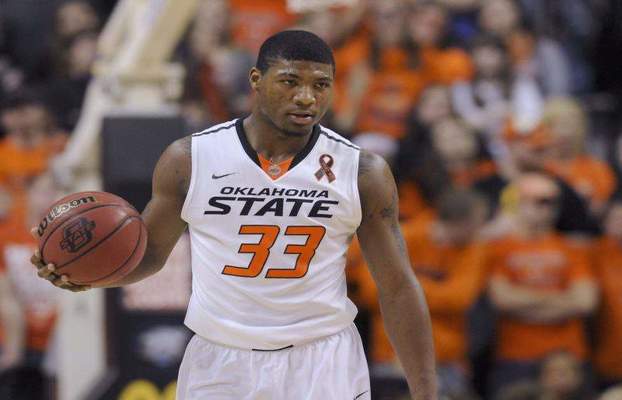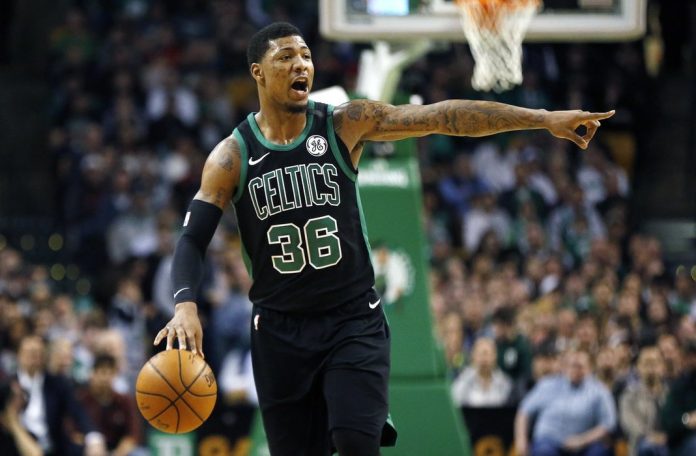When Marcus Smart was selected sixth overall in the 2014 NBA Draft, Celtics fans didn’t know how to feel. There was the incident at Oklahoma State where he punched a fan after reportedly being called a racial slur. He was undoubtedly a fiery competitor, but that didn’t always lead to the best decision-making.
On the defensive side of the ball, Smart was as good as he’s been in the NBA. During his two years at Oklahoma State, Smart was first in both steals per game and steal percentage in the Big 12; ranking second and third in college basketball in his first year and fifth and fourth in his second year. It was (and still is) the offensive side of the ball where Smart (has) struggled.
In his freshman year at Oklahoma State, Smart averaged 3.4 turnovers per game, which ‘led’ the team. While not a great number to have in your starting point guard’s stat line, it was understandable; he was young and adjusting to new teammates. It’s a common trend for young guards. The only problem is that while Smart decreased his average to 2.6 per game, that still led the team. The NBA has been no different.

During his first two seasons in the league, it seemed like something clicked for Smart. He averaged 1.3 turnovers per game in both his rookie and sophomore seasons. However, in the past two seasons, those averages have jumped to 2.0 and 2.4 a contest. Unfortunately for Smart, the evidence is pretty damning, as he’s roughly had the same amount of playing time each season.
Breaking down his turnover numbers further: of the 458 turnovers Smart has accrued during the regular season, 251 were due to a bad pass by Smart. Now, to be fair to Smart, Basketball Reference’s definition of a bad pass is relatively subjective. However, having over half of your career turnovers (roughly 54%) be from a bad pass is not a good look for a guy that may be Boston’s starting point guard of the future.
At the time of this writing, Uncle Drew (Kyrie Irving) could potentially be an unrestricted free agent next summer (if he opts out of his current contract via his player option) while “Scary Terry” Rozier will be a restricted free agent. There have been conflicting reports about whether Irving wants to stay with Boston or bolt for a division rival, specifically the two teams in New York. Let’s just say for the purposes of this exercise that Kyrie bolts and Rozier decides he wants to parlay his strong showing during Kyrie’s absence the season prior into a shot for a starting gig elsewhere.
The Celtics are shockingly left with just Marcus Smart and Brad Wanamaker; maybe Walter Lemon Jr. if he has a decent showing this season. Where would that leave Boston?
The short answer: in good hands.
Yes, I know Basketball Reference will tell you that via his per-36 numbers Marcus Smart would have averaged 2.9 turnovers per game. I also know that his per-36 average of 5.8 assists per game would have ranked 14th league-wide, and six spots ahead of current teammate Kyrie Irving.
I also know that I have proof Marcus Smart is more than capable of making the right reads on offense:
What a pass from Marcus Smart pic.twitter.com/mAh7Tz3JFc
— Chris Grenham (@chrisgrenham) May 26, 2018
That pass was from this year’s Eastern Conference Finals against LeBron James and the Cleveland Cavaliers.
Here’s another pass from that same series:
Describe this Marcus Smart outlet pass in one emoji#RingerNBA pic.twitter.com/YUxafECAmq
— The Ringer (@ringer) May 22, 2018
While integral to every point guard’s game, passing isn’t the only part of the game they’re asked to play. They’re asked to play defense, something Smart has done exceptionally well.
To date, Smart has 9.8 defensive win shares, which essentially translates to Marcus Smart has won the Celtics 10 games on his defense alone. Why does that sound familiar…
Furthering Smart’s case for being the starter in the future is that of all the 5-man combinations Brad Stevens used last season, Smart was in 9 out of the top 10.
The aspect of Smart’s game that hasn’t been touched yet is his shot selection. There are nights where he looks like the second coming of Steph Curry, hitting ridiculous shots at angles that would make your geometry teacher’s head spin.
Then there are nights where Smart takes shots as soon as the ball’s in his hands, and you bury your face in yours expecting the worst. (Or maybe that’s just me).
ESPN writer Chris Forsberg took a look at Smart’s shooting tendencies, and found something pretty interesting:
Consider this: When Smart shoots 30 percent or worse from the field in a game this season, the Celtics are 11-0. When he shoots better than 30 percent, Boston is a mere 5-4.
Granted, at the time of the writing, that was a 19-game sample size but still an interesting stat.
Marcus Smart is undoubtedly the heart and soul of the Boston Celtics and has been since he entered the league. While other youngsters like Jaylen Brown and Jayson Tatum are coming into their own, they aren’t at “face of the franchise” level. Smart was drafted to be, and he certainly can be.

